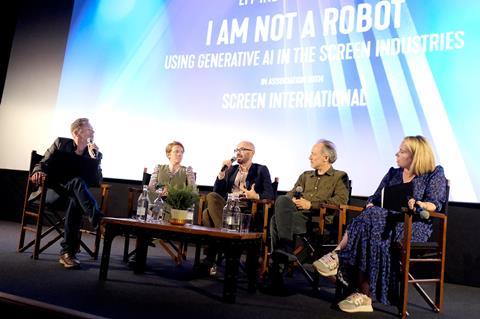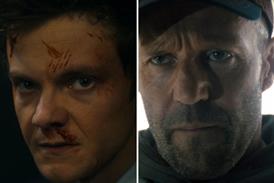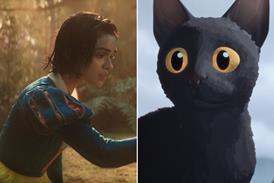
Tim Webber, chief executive officer of UK-based animation and visual effects company Framestore, says he believes generative artificial intelligence (AI) is not as impactful as initially thought.
“It is neither quite as revelatory and amazing as we all thought it might be in the early days, nor is it quite as scary and threatening as we all thought it might be in the early days,” Webber said to a packed out room at Picturehouse Central where he was participating on a BFI London Film Festival industry panel about generative AI in the screen industries. “We are sort of passing somewhere in between.”
The Oscar-winning visual effects supervisor, whose credits include Gravity, Children Of Men and The Dark Knight, explained how using generative AI for video is “much much harder” than for images.
”The big issue is temporal consistency,” Webber said. ”Getting exactly the style you want and having the control is one of the difficult things about generative AI. They’re not very directable. They’re not very controlled.”
Revolutionary not evolutionary
When pressed for a timeline on when AI will become fully embedded into the filmmaking process, Webber doubted it would be a sudden change. ”We’re sort of using it in a small way, in the very early days of a process and it will gradually work its way through to the end,” Webber explained, referencing the speed of change in AI technologies. “It’s scary and the changes are not evolutionary, they’re revolutionary often.
“I think to get to the end, and this is just a guess, but to get to the end of the process, final images that are generally largely created by generative AI in high quality moving images, will be more than five years definitely.”
Webber also referenced the WGA and SAG-AFTRA strikes, where AI is one of the key concerns for unions, stressing “there are many, many ways in which people do need protection”.
He continued: ”But one point I would like to make is, actors aren’t hired for their faces. Even if it’s George Clooney, we’re not hiring him for his face,” Webber stressed. “We’re hiring him for his performance, his personality and what he brings to it as a character.
“We create many characters [at Framestore] and we put a huge amount of work into them like Paddington Bear and Rocket Racoon but it’s not the same as bringing life to a character and getting someone that can carry a film is a whole different challenge altogether.”
New storyboarding tool
Also sitting on the panel, which was held in association with Screen International, was Sami Arpa, CEO of Swiss-based AI company Largo, who unveiled a new AI storyboarding tool which allow for more “style coherent” creations.
While traditional storyboarding often relies on generic images and is a timely process, Largo’s new tool uses ”highly specialized generative AI tools tailored to specific styles” to create storyboards efficiently and with a consistent style.
“The tool not only streamlines the concept testing process but also opens the door to focus group testing for understanding demographics and audience size,” Arpa explained. “This process is no longer exclusive to major studios due to cost constraints. Small production companies can now benefit from such process with the power of AI-assisted storyboarding together with our focus group tests which are fully automated, making the creative process more efficient and accessible.
”One big advantage of the model is also diminishing confidentiality concerns. We have a generic AI tool which creates mediocre results, and is trained on royalty-free materials. Then, on top of that, we can personalize those GenAI tools with only a few images to create highly style coherent images, keeping the model exclusive to the creator, thus eliminating concerns of AI distributing your creative work to others.”
The model is being used for short commercial videos but the aim is to gradually roll out the service to film and TV producers.
The other panelists included Rianna Dearden, narrative lead at video game developer Charisma.ai; and Hannah Wylie, a partner at law firm Harbottle & Lewis.
























No comments yet